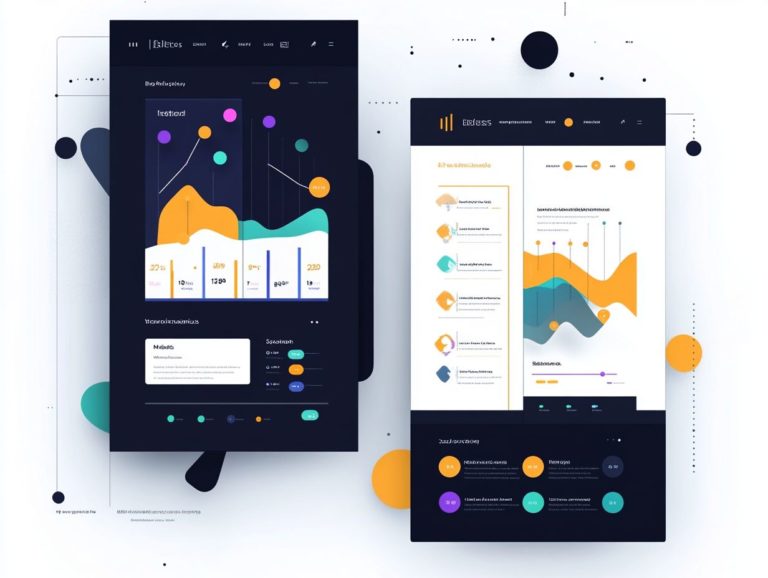“How to Use Analytics for Lead Generation Success”
Let's Set Up Your Lead Generation Strategy
Fill out the form below, and our team will get in touch with you to create a tailored solution for your business.
In today’s competitive landscape, harnessing the power of analytics is crucial for effective lead generation. Discover the pivotal role analytics plays in your lead generation success!
This exploration reveals how data analysis can elevate your marketing efforts. You’ll learn to identify target audiences through insightful demographic and behavioral data. You will also track essential metrics that define your success.
We will discuss strategies to optimize lead generation through data-driven decisions. Additionally, we will provide guidance on navigating the complexities of data privacy regulations.
Contents
- Key Takeaways:
- The Role of Analytics in Lead Generation
- Using Analytics to Identify Target Audience
- Let's Set Up Your Lead Generation Strategy
- Tracking and Measuring Lead Generation Success
- Optimizing Lead Generation Strategies with Analytics
- The Impact of Data Privacy Regulations on Lead Generation
- Let's Set Up Your Lead Generation Strategy
- Frequently Asked Questions
- What is lead generation and why is it important?
- How can analytics be used for lead generation success?
- What type of data should I track for lead generation success?
- How can I use analytics to improve my lead conversion rate?
- What are some common mistakes businesses make when using analytics for lead generation?
- Can analytics also be used for lead nurturing and retention?
Key Takeaways:

- Utilize data analysis to understand the importance of analytics in lead generation.
- Identify and target your audience effectively using demographic and behavioral data.
- Measure and track success through key metrics. Optimize your lead generation strategies with analytics.
The Role of Analytics in Lead Generation
Analytics is vital for effective, data-driven lead generation, giving you the power to refine your strategies with precise insights into performance metrics tied to your marketing campaigns.
By harnessing analytics tools such as Google Analytics and Customer Relationship Management (CRM) systems, you can track user behavior, assess lead quality, and pinpoint your target audience segments.
This approach not only sharpens your understanding but also boosts your customer acquisition cost efficiency and accelerates your sales velocity.
Understanding the Importance of Data Analysis
Data analysis is essential for grasping the effectiveness of your lead generation efforts. It uncovers insights into performance that can refine your marketing strategies for enhanced efficiency.
By analyzing critical metrics like lead conversion rates and response rates, you can identify key areas for improvement. Spotting trends can propel your success.
A/B testing helps you try out different strategies to see which works best. This enables you to compare and effectively optimize your content marketing approaches.
User behavior analysis is integral to this process. It offers a deeper understanding of how potential customers engage with your campaigns, allowing you to fine-tune your email marketing tactics.
Using Analytics to Identify Target Audience
Utilizing analytics effectively gives you the power to pinpoint your target audience with precision. By examining both demographic and behavioral data, you can craft a content plan and marketing strategies that resonate with your audience.
This approach enhances your understanding and elevates your overall business effectiveness.
Utilizing Demographic and Behavioral Data

Utilizing demographic and behavioral data gives you the power to categorize leads into marketing qualified leads (MQLs) and sales qualified leads (SQLs). This significantly enhances your lead generation strategy.
Let's Set Up Your Lead Generation Strategy
Fill out the form below, and our team will get in touch with you to create a tailored solution for your business.
By looking into aspects such as age, location, interests, and online behavior, you can tailor your outreach efforts with precision. For example, you might discover that users aged 25-34 are more inclined to engage with your content. This insight could lead you to craft a targeted email campaign specifically designed for that demographic.
Furthermore, tracking user interactions on social media can reveal preferences and pain points. This information can inform your lead scoring system, allowing you to prioritize high-value prospects. Such insights sharpen your targeting and boost the relevance of your marketing messages across various channels.
Tracking and Measuring Lead Generation Success
Tracking and measuring your lead generation success are vital elements of any effective marketing campaign. These actions provide invaluable insights into conversion rates and overall performance metrics. This enables you to refine your strategies and drive better results.
Start using data today to supercharge your lead generation!
Key Metrics to Monitor
Key metrics such as lead conversion rate, cost per lead, and sales velocity serve as vital indicators of the success of your lead generation efforts.
Understanding these metrics gives you the power to assess how effectively your campaigns attract valuable leads. For example, the lead conversion rate shows the percentage of leads that ultimately become paying customers, making it essential for evaluating your campaign’s effectiveness.
Monitoring cost per lead is equally important as it helps you gauge the financial efficiency of your marketing strategies, ensuring that your resources are directed toward the most productive channels. Sales velocity reveals how swiftly leads progress through the sales funnel, providing insights into the overall efficiency of your sales process.
By leveraging advanced analytics tools, you can significantly enhance your ability to track these metrics. This offers invaluable insights that can inform adjustments to your marketing strategies and improve lead quality, aligning seamlessly with your broader marketing objectives.
Optimizing Lead Generation Strategies with Analytics
Optimizing your lead generation strategies with analytics is crucial for elevating your marketing efficiency. By utilizing the strength of data, you can effectively align your efforts with your business objectives, ensuring you reach your desired outcomes with precision and impact.
Using Data to Improve Campaigns

Leveraging data effectively gives you the power to enhance your campaigns by fine-tuning audience engagement through targeted strategies and insightful A/B testing.
By analyzing user interactions, you can craft messaging that resonates with your audience’s preferences. For instance, data might show that a specific demographic responds better to video content than static ads, prompting you to pivot your content strategy accordingly.
Monitoring click-through rates can illuminate which distribution channels warrant more emphasis, perhaps suggesting a shift toward social media platforms over email campaigns for specific messages. This continuous analysis elevates your current initiatives and yields invaluable insights to inform future campaign designs, ensuring that each effort becomes progressively more refined and effective.
The Impact of Data Privacy Regulations on Lead Generation
Data privacy regulations profoundly influence your lead generation practices, compelling you to navigate compliance and ethically collect customer data. This approach is essential for maintaining trust and ensuring transparency in your marketing efforts.
Ensuring Compliance and Ethical Use of Data
Ensuring compliance with data privacy regulations and the ethical use of data is essential for minimizing your customer acquisition costs and enhancing your brand reputation.
Let's Set Up Your Lead Generation Strategy
Fill out the form below, and our team will get in touch with you to create a tailored solution for your business.
To achieve this, you should establish clear processes that track where data comes from and how it’s used. By maintaining transparency in how data is collected, processed, and shared, you can foster a culture of accountability that resonates deeply with consumers.
Implementing robust data governance frameworks will allow you to regularly evaluate your data practices, ensuring they remain aligned with evolving regulations. These proactive measures safeguard you against legal repercussions and build trust with customers, who increasingly prioritize brands that exemplify responsible data handling and ethical practices in today’s digital landscape.
Frequently Asked Questions
What is lead generation and why is it important?

Lead generation is the process of attracting and converting potential customers into actual customers. It is important because it helps businesses generate more sales and revenue.
Want to dive deeper into lead generation? Contact us today!
How can analytics be used for lead generation success?
Analytics helps track and analyze customer behavior. It identifies patterns and trends while measuring the effectiveness of lead generation strategies.
What type of data should I track for lead generation success?
Track essential data like website traffic and conversion rates. Also, monitor lead sources and customer engagement metrics, such as time on page and click-through rates.
How can I use analytics to improve my lead conversion rate?
Analyze data on customer behavior and lead sources. This will help you find areas to improve and adjust your lead generation strategies.
What are some common mistakes businesses make when using analytics for lead generation?
A common mistake is failing to set clear goals and metrics. Businesses also often neglect to regularly review data, which is crucial for informed decisions.
Can analytics also be used for lead nurturing and retention?
Absolutely! Analytics can track customer behavior even after they become leads or customers. This insight is key for improving lead nurturing and retention strategies.






